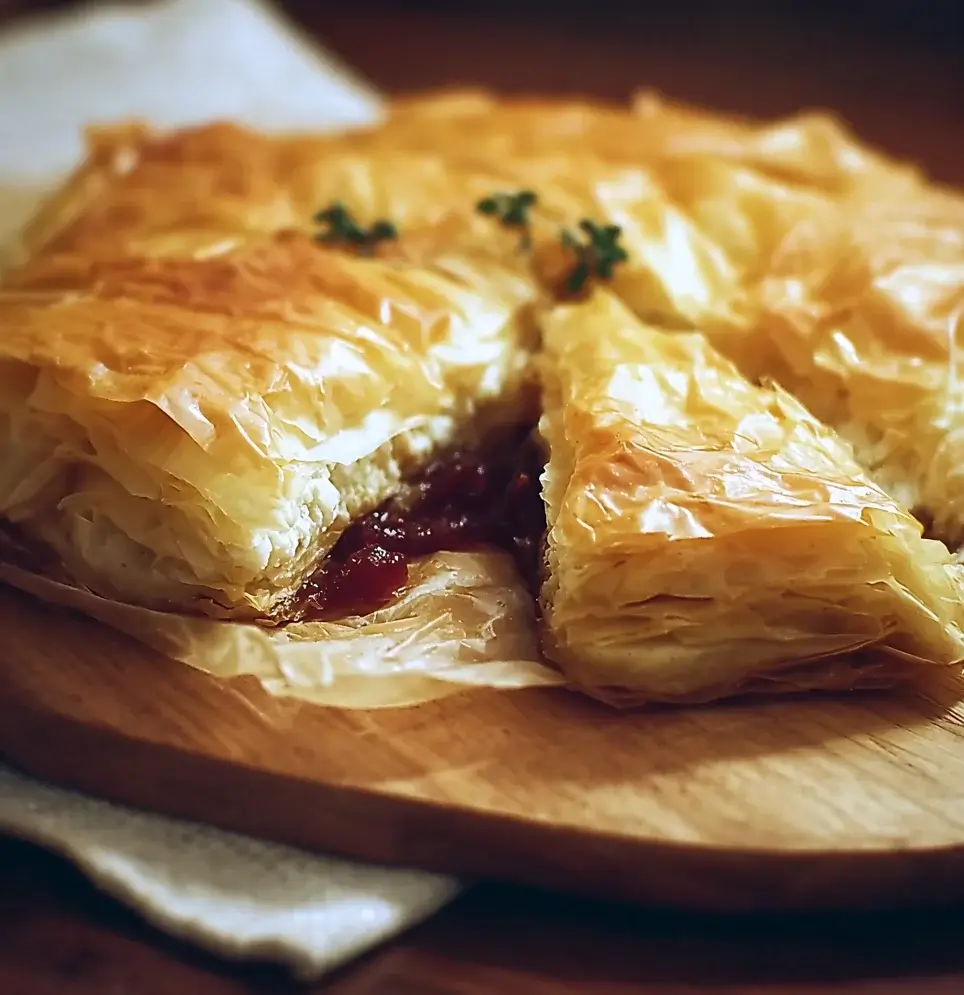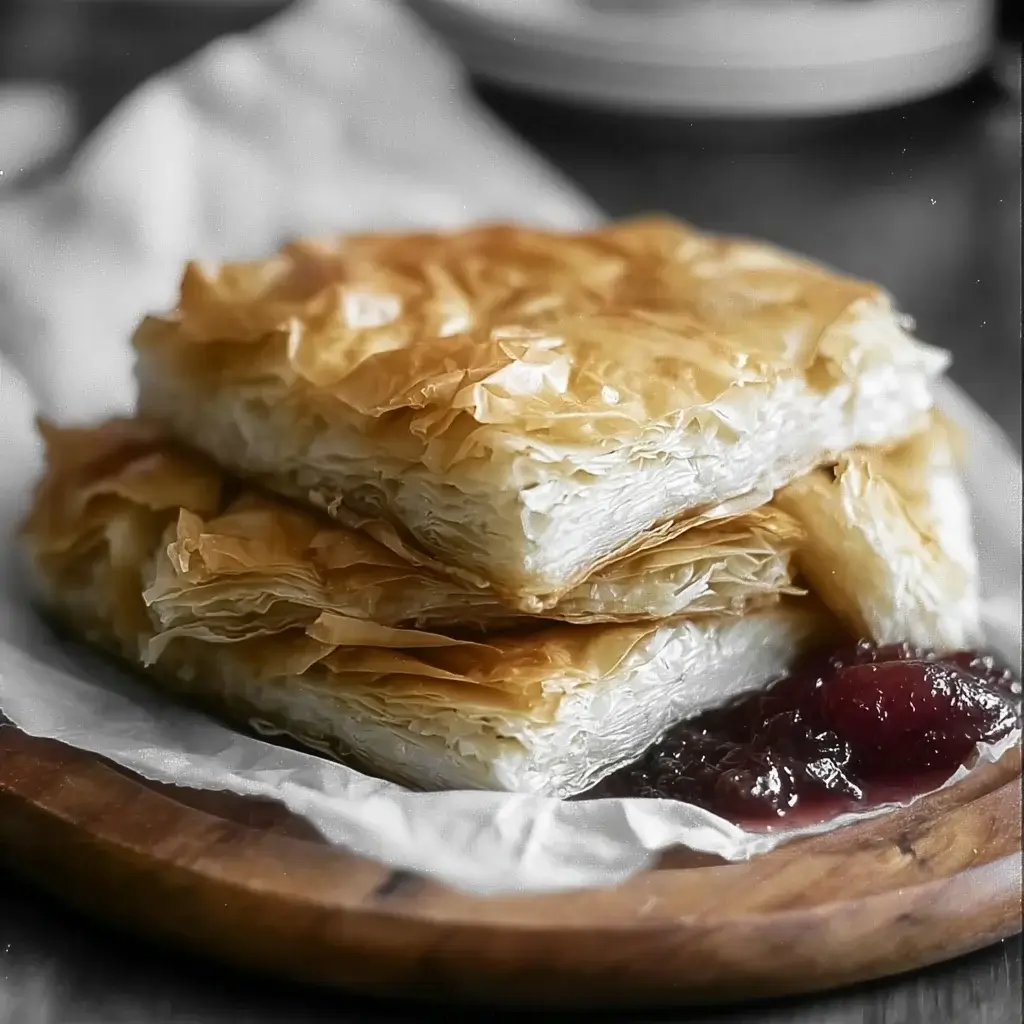
Introduction to Flaky Phyllo Dough
Phyllo dough is the secret to so many stunning dishes—from savory spanakopita to sweet baklava—and mastering its delicate layers opens the door to endless culinary creativity. This guide-style recipe walks you through the essentials of handling phyllo: how to keep it from drying out, layer it like a pro, and bake it into crispy, golden perfection. Whether you’re crafting appetizers, mains, or desserts, this flaky, paper-thin pastry is your new kitchen MVP.
Why You’ll Love This Flaky Phyllo Dough
-
Step-by-step tips to demystify phyllo dough.
-
Endless versatility for savory and sweet dishes.
-
Impressive results with a delicate, crispy texture.
-
Easy to store, freeze, and customize.
-
Perfect for elegant entertaining or everyday bakes.
Ingredients for Flaky Phyllo Dough
Creating flaky phyllo dough starts with some basic ingredients that you likely have in your pantry. Here’s what you’ll need:
- All-purpose flour: This is the backbone of your dough, providing structure and texture.
- Salt: A pinch of salt enhances the flavor, making your pastry even more delicious.
- Lemon juice: This adds a subtle tang and helps tenderize the dough, making it easier to roll out.
- Vegetable oil: A little oil keeps the dough moist and pliable, ensuring it doesn’t dry out.
- Cold water: Essential for bringing the dough together, cold water helps maintain the right texture.
- Melted butter: For brushing between layers, this adds richness and promotes that coveted flakiness.
For those looking to experiment, consider adding a tablespoon of vinegar to the wet ingredients for an even flakier result. If you prefer a whole wheat version, simply substitute half of the all-purpose flour with whole wheat flour. You can find the exact measurements for these ingredients at the bottom of the article, ready for printing!
How to Make Flaky Phyllo Dough
Making flaky phyllo dough is a straightforward process that anyone can master. Follow these simple steps, and you’ll be on your way to creating delicious pastries that will impress your family and friends.
Step 1: Combine Dry Ingredients
Start by grabbing a large mixing bowl. Combine the all-purpose flour and salt. Mix them well with a whisk or fork. This step ensures that the salt is evenly distributed, enhancing the flavor of your dough.
Step 2: Mix Wet Ingredients
In a separate bowl, whisk together the lemon juice, vegetable oil, and cold water. The cold water is key here; it helps keep the dough tender. Make sure everything is well combined before moving on.
Step 3: Form the Dough
Gradually add the wet mixture to the flour mixture. Stir until a dough begins to form. It might look a bit shaggy at first, but don’t worry! That’s perfectly normal. Just keep mixing until it starts to come together.
Step 4: Knead the Dough
Now it’s time to knead! Transfer the dough to a lightly floured surface. Knead it for about 5 minutes until it’s smooth and elastic. This step is crucial for developing the right texture in your flaky phyllo dough.
Step 5: Rest the Dough
Wrap the dough in plastic wrap and let it rest at room temperature for at least 30 minutes. This resting period allows the gluten to relax, making it easier to roll out later. Use this time to clean up your workspace or plan your next culinary masterpiece!
Step 6: Roll Out the Dough
After resting, divide the dough into 4 equal pieces. On a floured surface, roll each piece out as thin as possible, ideally to about 1/16 inch thick. The thinner, the better! This is where the magic happens, creating those delicate layers.
Step 7: Brush with Butter
For that extra flakiness, brush each sheet with melted butter before stacking them. This not only adds flavor but also helps create those beautiful layers that will puff up in the oven. Don’t be shy with the butter!
Step 8: Store or Use Immediately
Once you’ve rolled out your phyllo dough, you can use it right away or store it. If you’re not using it immediately, keep it in the refrigerator for up to 2 days or freeze it for up to 2 months. Just make sure to wrap it well to prevent drying out.

Tips for Success
- Keep your workspace floured to prevent sticking while rolling out the dough.
- Use cold ingredients for a tender texture; cold water and butter are key!
- Don’t rush the resting time; it’s essential for easy rolling.
- Layering with butter is crucial for that flaky finish—don’t skip it!
- Practice makes perfect; your first batch may not be flawless, but it’ll still taste great!
Equipment Needed
- Mixing bowl: A large bowl for combining ingredients. A pot can work in a pinch.
- Whisk or fork: For mixing dry and wet ingredients. A spoon will do if that’s all you have.
- Rolling pin: Essential for rolling out dough. A wine bottle can serve as a great substitute!
- Plastic wrap: To cover the dough while it rests. A clean kitchen towel can also work.
Variations of Flaky Phyllo Dough
- Herbed Phyllo: Add dried herbs like oregano or thyme to the flour for a fragrant twist.
- Spiced Dough: Incorporate a teaspoon of cinnamon or nutmeg for a sweet version, perfect for desserts.
- Whole Wheat Phyllo: Substitute half of the all-purpose flour with whole wheat flour for a nuttier flavor and added fiber.
- Gluten-Free Option: Use a gluten-free flour blend to make this recipe suitable for those with gluten sensitivities.
- Nutty Phyllo: Mix in finely ground nuts, like almonds or walnuts, into the dough for added texture and flavor.
Serving Suggestions for Flaky Phyllo Dough
- Pair with Tzatziki: This cool, creamy dip complements savory phyllo pastries beautifully.
- Serve with a Salad: A fresh Greek salad adds a refreshing crunch to your meal.
- Wine Pairing: A crisp white wine enhances the flavors of your flaky creations.
- Presentation: Arrange pastries on a colorful platter for an eye-catching display.
FAQs about Flaky Phyllo Dough
Can I make flaky phyllo dough ahead of time?
Absolutely! You can prepare the dough in advance and store it in the refrigerator for up to 2 days. If you want to keep it longer, freeze it for up to 2 months. Just make sure to wrap it tightly to prevent it from drying out.
What can I use flaky phyllo dough for?
This versatile dough is perfect for both sweet and savory dishes. Think spanakopita, baklava, or even creative appetizers. The possibilities are endless!
How do I prevent my phyllo dough from drying out?
Keep your phyllo sheets covered with a damp kitchen towel while you work. This helps maintain moisture and prevents the dough from becoming brittle.
Can I substitute ingredients in flaky phyllo dough?
Yes! You can use whole wheat flour for a nuttier flavor or a gluten-free flour blend for a gluten-free version. Just remember that substitutions may slightly alter the texture.
Why is my phyllo dough not flaky?
If your phyllo dough isn’t flaky, it might be due to not enough butter between the layers or not rolling it thin enough. Make sure to brush each layer generously with melted butter and roll it out as thin as possible for that perfect flakiness!
Final Thoughts
Creating flaky phyllo dough from scratch is more than just a cooking task; it’s an experience that connects you to the heart of Mediterranean cuisine. The joy of rolling out those delicate layers, brushing them with butter, and watching them transform into golden, flaky pastries is truly rewarding. Whether you’re making a savory dish for a family gathering or a sweet treat for a special occasion, this recipe brings a sense of accomplishment. So roll up your sleeves, embrace the process, and let the aroma of freshly baked phyllo fill your kitchen. You won’t regret it!
Flaky Phyllo Dough: Master the Art of Perfect Pastry!
Ingredients
Method
- In a large mixing bowl, combine the all-purpose flour and salt. Mix well.
- In a separate bowl, whisk together the lemon juice, vegetable oil, and cold water.
- Gradually add the wet ingredients to the flour mixture, stirring until a dough begins to form.
- Knead the dough on a lightly floured surface for about 5 minutes, until it is smooth and elastic.
- Wrap the dough in plastic wrap and let it rest at room temperature for at least 30 minutes.
- After resting, divide the dough into 4 equal pieces. Roll each piece out on a floured surface as thin as possible, ideally to about 1/16 inch thick.
- Brush each sheet with melted butter before stacking them, if desired, for extra flakiness.
- Use the rolled phyllo dough immediately or store it in the refrigerator for up to 2 days, or freeze for up to 2 months.
Nutrition
Notes
- To make the dough even flakier, consider adding a tablespoon of vinegar to the wet ingredients.
- For a whole wheat version, substitute half of the all-purpose flour with whole wheat flour.

